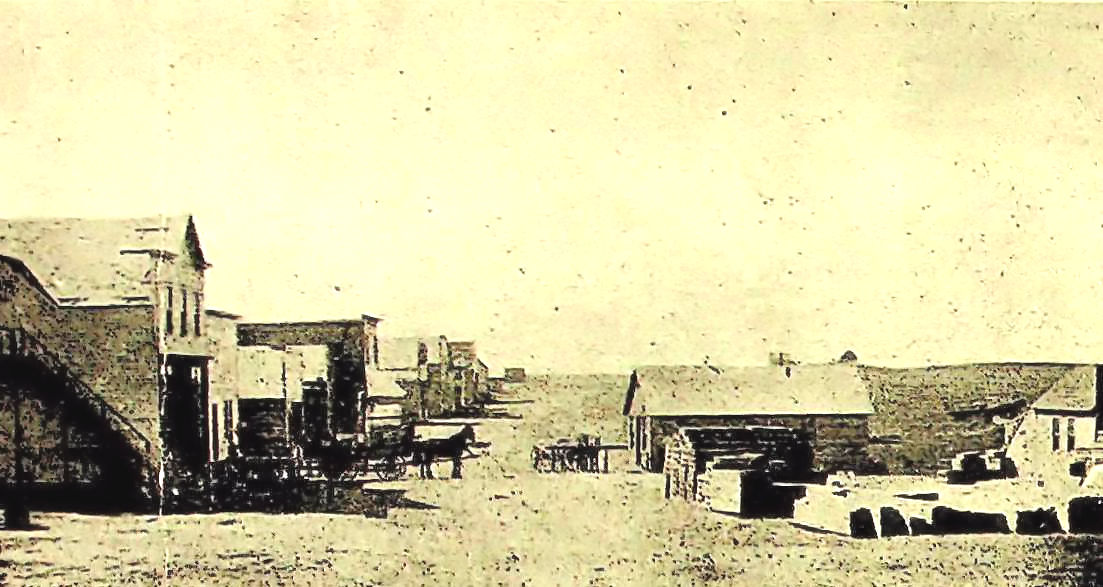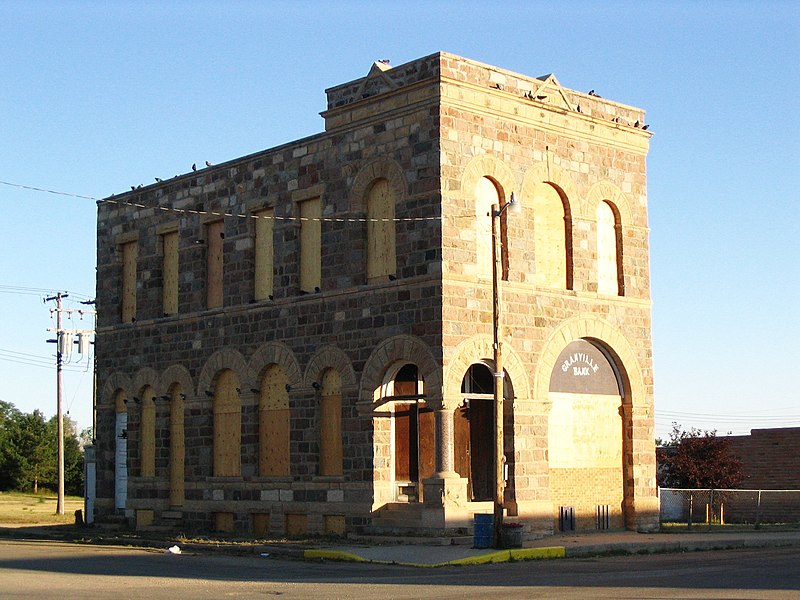|
A great portion of the Granville information is resourced in MCHENRY COUNTY, Its History and Its People, 1885-1985, also North Dakota Place Names by Douglas Wick and Origins of North Dakota Place Names by Mary Ann Barnes Williams.
 Granville is a City and a Township [T155, Range R79]. As a Great Northern Railroad station it was founded in 1886 in the northeast quarter of Section 8 of the Township. They were named for Granville Mellen Dodge, [ Note: Dodge's given name was actually spelled Grenville] a civil war hero, military intelligence pioneer, Indian fighter and notably in this area a civil engineer with the railroad who was later an executive with the Union Pacific Railroad and involved in politics. Granville is an Old French name meaning from the large town. The post office was established 31 March 1888 with Morley W. Ludlow as Postmaster. It was incorporated as a city in 1907. The elevation is 1521, the Zip Code is 58741, and the city reached a peak population of 455 in 1910 and was at 265 in 2018. Granville is a City and a Township [T155, Range R79]. As a Great Northern Railroad station it was founded in 1886 in the northeast quarter of Section 8 of the Township. They were named for Granville Mellen Dodge, [ Note: Dodge's given name was actually spelled Grenville] a civil war hero, military intelligence pioneer, Indian fighter and notably in this area a civil engineer with the railroad who was later an executive with the Union Pacific Railroad and involved in politics. Granville is an Old French name meaning from the large town. The post office was established 31 March 1888 with Morley W. Ludlow as Postmaster. It was incorporated as a city in 1907. The elevation is 1521, the Zip Code is 58741, and the city reached a peak population of 455 in 1910 and was at 265 in 2018.

Granville Township
By Russell E. Boutilier, Township Clerk
 Thirty-three homesteaders who were
legal voters of the congressional township,
petitioned the McHenry County Board of
Commissioners on January 29, 1901 to
organize Township 155 North of Range 79
West of the 5th Principal Meridian under the
authority vested by the State of North
Dakota. Permission was granted on April 2,
1901 to organize the township. Thirty-three homesteaders who were
legal voters of the congressional township,
petitioned the McHenry County Board of
Commissioners on January 29, 1901 to
organize Township 155 North of Range 79
West of the 5th Principal Meridian under the
authority vested by the State of North
Dakota. Permission was granted on April 2,
1901 to organize the township.
 The first election was held to select three
supervisors, a clerk, assessor, justice of the
peace, constable, road supervisor and a
treasurer to serve on the township board
George H. Dwello served aa clerk and David F. Boutilier was chosen chairman. At first
elections were held in a central school
house, then in the Township Hall, and In
1949, by resolution, a move was made to the
Memorial Hall In Granville. The first election was held to select three
supervisors, a clerk, assessor, justice of the
peace, constable, road supervisor and a
treasurer to serve on the township board
George H. Dwello served aa clerk and David F. Boutilier was chosen chairman. At first
elections were held in a central school
house, then in the Township Hall, and In
1949, by resolution, a move was made to the
Memorial Hall In Granville.
 In 1902 a road grader was purchased to
help keep the wagon trails In condition. A
bridge was constructed between Section 3
and 10, crossing Hay Creek, with the county
commissioners to pay $75 of the cost from
county funds. Other bridges were constructed, six more crossing Hay Creek, two
crossing Buffalo Creek and one across the
old highway between Section 2 and 11. The
first petition for the opening of a road was
presented to the Board by the
homesteaders. In 1902 a road grader was purchased to
help keep the wagon trails In condition. A
bridge was constructed between Section 3
and 10, crossing Hay Creek, with the county
commissioners to pay $75 of the cost from
county funds. Other bridges were constructed, six more crossing Hay Creek, two
crossing Buffalo Creek and one across the
old highway between Section 2 and 11. The
first petition for the opening of a road was
presented to the Board by the
homesteaders.
 The city of Granville consists of forty
acres In the northwest quarter of Section 9
and sixty acres in the northeast quarter of
Section 8. Buildings were being constructed rapidly in 1901 along both sides of
the main street and the city was incorporated In 1904. The city of Granville consists of forty
acres In the northwest quarter of Section 9
and sixty acres in the northeast quarter of
Section 8. Buildings were being constructed rapidly in 1901 along both sides of
the main street and the city was incorporated In 1904.
 In 1904 the Board created a general fund,
road fund and a bridge fund. A road poll tax
of $1.50 was levied that year; today the poll
tax Is $1.00 for every eligible voter. They
also assembled themselves as a Board of
Health and established a pest house about
three-quarters of a mile east of town. In
April, 1904 there were two cases of
smallpox resulting in one death. Care of the
patients and the burial was paid by the
Board of Health and reimbursed from county funds. In 1904 the Board created a general fund,
road fund and a bridge fund. A road poll tax
of $1.50 was levied that year; today the poll
tax Is $1.00 for every eligible voter. They
also assembled themselves as a Board of
Health and established a pest house about
three-quarters of a mile east of town. In
April, 1904 there were two cases of
smallpox resulting in one death. Care of the
patients and the burial was paid by the
Board of Health and reimbursed from county funds.
 Four one-room rural schools were built in
Granville Township: School No. 1, Lutgens,
in Section 22; School No. 2, Linden Lane in
Section 1; School No. 3, McMahons in Section 24; and School No. 5, Elm Ridge in Section 29. School No. 4 was built in 1904 on a
hill one block east of Granville's main street
to serve as a grade and high school. In 1916
a move was made into a larger, more
modern building located south of
Granville's city limits. Now, new elementary
and a new high school building have been
built and the white brick building has been
removed. Four one-room rural schools were built in
Granville Township: School No. 1, Lutgens,
in Section 22; School No. 2, Linden Lane in
Section 1; School No. 3, McMahons in Section 24; and School No. 5, Elm Ridge in Section 29. School No. 4 was built in 1904 on a
hill one block east of Granville's main street
to serve as a grade and high school. In 1916
a move was made into a larger, more
modern building located south of
Granville's city limits. Now, new elementary
and a new high school building have been
built and the white brick building has been
removed.
 In 1906 a franchise for construction of a
telephone line across the township was
aliowed. In 1909 the petition of the Egg
Creek Telephone Company for a right-of-way was granted. A three cent bounty on
gopher tails during the months of April and
May was set in 1922. Only one cent per tail
was paid during the remaining months of
the year and gopher continued to be a problem for many years. By 1938 grasshoppers
were a problem. The township paid for labor
and material on four grasshopper machines
and poison was also purchased and
distributed. In 1906 a franchise for construction of a
telephone line across the township was
aliowed. In 1909 the petition of the Egg
Creek Telephone Company for a right-of-way was granted. A three cent bounty on
gopher tails during the months of April and
May was set in 1922. Only one cent per tail
was paid during the remaining months of
the year and gopher continued to be a problem for many years. By 1938 grasshoppers
were a problem. The township paid for labor
and material on four grasshopper machines
and poison was also purchased and
distributed.
 Eighty-four years has changed Granville
Township from a pioneer settlement to an
organized township with a city, business
firms, three churches, one public school,
farms and fraternal organizations. Several
descendants of early pioneers still reside
on the original homesteads. Eighty-four years has changed Granville
Township from a pioneer settlement to an
organized township with a city, business
firms, three churches, one public school,
farms and fraternal organizations. Several
descendants of early pioneers still reside
on the original homesteads.

The Granville State Bank is listed on the National Register of Historic Places
Northwest Corner of 2nd Street and Main Street South
Click on pictures for larger views.
The 1902 Street View of Granville was provided to the Centennial by Cora Odland and Doris Johnson.
The Granville State Bank picture is credited to Publichall, CC BY-SA 3.0 via Wikimedia Commons
|